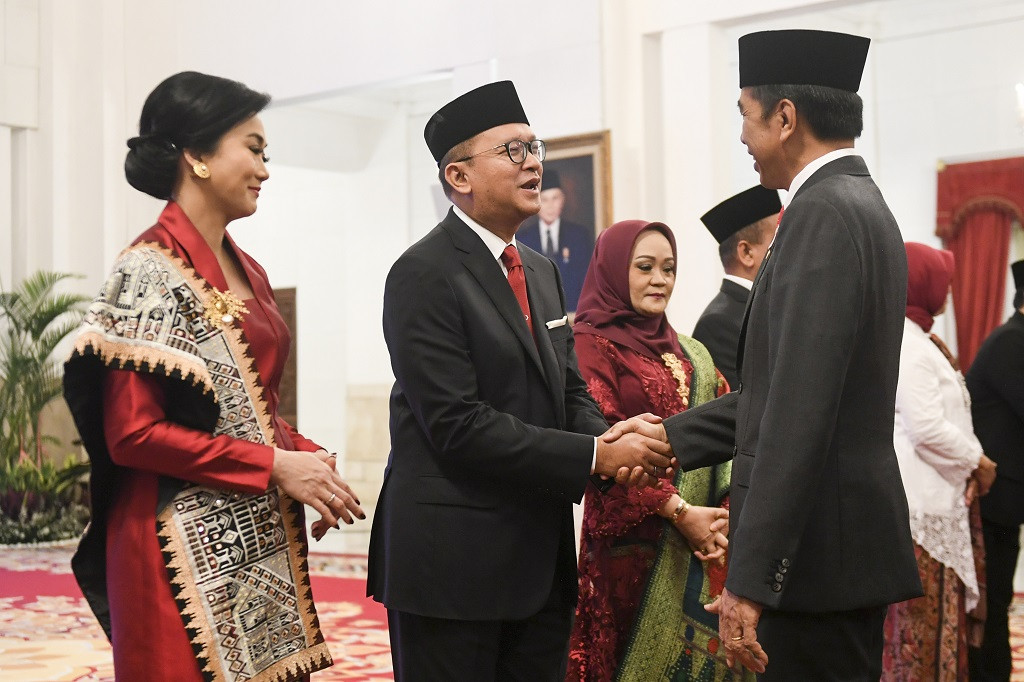Popular Reads
Top Results
Can't find what you're looking for?
View all search resultsPopular Reads
Top Results
Can't find what you're looking for?
View all search resultsOn precarious ground
The frequency of diplomatic personnel changes has put Indonesia on precarious ground, especially as it relates to sustained engagement with Washington.
Change text size
Gift Premium Articles
to Anyone
I
t is difficult not to associate the changes made last week to the roster of President Joko “Jokowi” Widodo’s administration with political maneuvering ahead of the 2024 election.
For instance, the President gave clear signs that he was installing not just his loyal supporters but also close allies of State-Owned Enterprises Minister Erick Thohir, who is a leading contender to be the running mate of whoever Jokowi ends up endorsing to succeed him as president.
However, it is important to underscore the practical consequences of the personnel changes as well, particularly their potential adverse effect on the Indonesia-United States partnership, one of Jakarta’s most strategic.
In the latest reshuffle, Indonesian Ambassador to the United States Rosan P. Roeslani was asked to return to serve as deputy SOEs minister after just two years in Washington.
As the former chairman of the Indonesian Chamber of Commerce and Industry (Kadin), he is seen as a potential successor to Erick, should the current minister run next year. It also helps that Rosan is Erick’s close associate, having worked with him on Jokowi’s reelection campaign.
Rosan replaces Pahala N. Mansury, who is now deputy foreign minister, a position that has been vacant since the departure last year of Mahendra Siregar, who is currently the chief of the Financial Services Authority (OJK).
Analysts say these subtle moves align with Jokowi’s push for a more economy-oriented foreign policy, one that courts trade and investment and seeks to break into so-called nontraditional markets.
But the frequency of these changes has put Indonesia on precarious ground, especially as it relates to sustained engagement with Washington.
The deputy foreign minister position has grown increasingly political during Jokowi’s second term, despite efforts from the ministry to reaffirm economic diplomacy on the President’s orders.
Instead of merging the parts of the foreign and trade ministries, an idea the President has toyed with before, Jokowi gave the deputy minister position to a political appointee who would answer to his closest aides, such as Luhut Pandjaitan, who is in charge of securing investment from Indonesia’s top partners.
After deputy foreign minister AM Fachir retired, he was replaced by Mahendra, a career diplomat with extensive economic experience.
Among insiders, however, Mahendra and Deputy Trade Minister Jerry Sambuaga are known as Luhut’s men, which likely contributed to an uneasiness resulting in the former’s eventual departure to the OJK.
Similarly, the latest reshuffle saw the entry of more people linked to the Indonesian Young Entrepreneurs Association (HIPMI) as well as Erick, another of Jokowi’s closest allies.
But with Rosan’s departure, Indonesia is once again left without a point man in Washington, at a time when most contacts from previous US governments have dissipated.
With three appointments in the span of four years, some sections of the foreign policy community are concerned that Indonesia may lose important connections with the US and the opportunity to strengthen them.
When asked to return to serve as deputy minister in 2019, Mahendra had only served as ambassador to the US for six months. At the time, Jakarta was trying to figure out how to deal with the Donald Trump presidency and its focus on trade barriers with Southeast Asia.
The subsequent Indonesian envoy in Washington and an old friend of Erick’s, Muhammad Lutfi, also stayed on for less than a year before he was appointed trade minister in 2020. During his short tenure, Lutfi secured Indonesia’s place in the US’ general system of preferences (GSP), a preferential trade designation.
Rumors have circulated that Jokowi might appoint former tourism and creative economy minister Wishnutama Kusubandio as the next ambassador to the US, but there is no guarantee that Washington will bother to get close to him, given that Jokowi has little more than a year left in office and the next president may well opt for someone else.
The Palace must quickly replace Rosan in Washington and ensure that the next appointee is given all the resources he needs to build strong and lasting ties that can weather both the US and Indonesian presidential elections next year.











